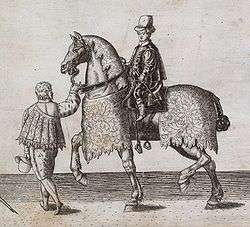Daniel Bacheler

Daniel Bacheler, also variously spelt Bachiler, Batchiler or Batchelar,[1] (baptized 16 March 1572 – buried 29 January 1619) was an English lutenist and composer.[2] Of all the English lutenist-composers, he is now credited as probably being the most successful in his own lifetime.[3]
Bacheler was born at Aston Clinton, Buckinghamshire, a son of Richard Bachelor and his wife Elizabeth (née Cardell).[4] He served an apprenticeship with his uncle, Thomas Cardell, who was a lutenist and dancing-master in the court of Queen Elizabeth I.[5]
He worked for Sir Francis Walsingham, Robert Devereux, 2nd Earl of Essex, and finally as a groom of the privy chamber for Queen Anne of Denmark, consort of James I.[2]
At the royal court he composed some fifty lute pieces.[2] These included a number of pavans, galliards, almaines and fantasies, including a set of variations on the popular tune "Monsieurs Almaine".[6] Elizabeth Roche, reviewing a CD of his work for the Daily Telegraph commented on the current neglect of Bacheler's music, suggesting that one reason is the "difficulty of his ornamental style, including arpeggios, trills, and even the dazzling tremolos that conclude his variations on Monsieurs Almaine".[7]
The Heralds Visitation records show that Bacheler received a grant of arms in 1606.[8]
He was buried on 29 January 1618/1619 in St Margaret's churchyard, Lee, Kent.[9]
Bibliography
- Bacheler, Daniel, Selected works for lute / Daniel Bacheler ; edited and transcribed by Martin Long, London: Oxford University Press, 1972. ISBN 0-19-355305-8
- Long, Martin., The music of Daniel Bacheler: a critical study, University of Sydney, 1969.
- Batchelor, A: 'Daniel Bacheler: The Right Perfect Musician', The Lute, 28 (1988), 3–12
References
- ↑ Grove Music Online, "Daniel Bacheler"
- 1 2 3 H. C. G. Matthew and Brian Harrison (2004). Oxford Dictionary of National Biography. Oxford University Press. ISBN 978-0-19-861411-1.
- ↑ Matthew Spring: The lute in Britain: a history of the instrument and its music, (Oxford Early Music Series), Oxford University Press, 2001, ISBN 0-19-816620-6, ISBN 978-0-19-816620-7. p. 243
- ↑ Anne Batchelor (1990). A Batchelor's Delight. Highgate Publications (Beverley) Ltd. ISBN 0-948929-40-5. p.39
- ↑ Batchelor p.40
- ↑ The tune of Monsieur's Almain is thought to originate earlier than 1584, and appears in settings by Thomas Morley, William Byrd and others. See, for example, C.A. Powers: 30 Elizabethan Songs - With Documentation, Chapter Twenty - Monsieur's Almain, 2008
- ↑ Telegraph.co.uk retrieved 1 February 2008.
- ↑ Batchelor p.47
- ↑ Batchelor p.43
External links
- Free scores by Daniel Bacheler at the International Music Score Library Project
- classicguitare, scores and Bio